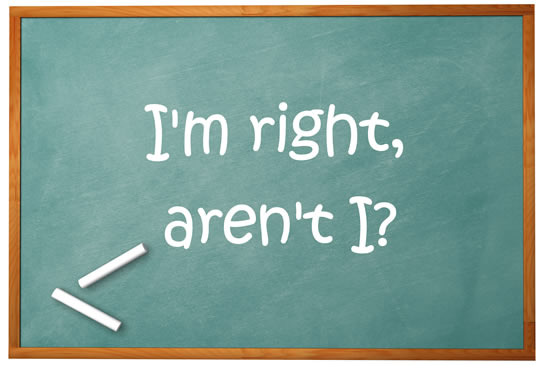
Image via http://bit.ly/1uP5XQW
As question tags são perguntas curtinhas no final de uma frase, pedindo uma confirmação.
– Quando esperamos uma resposta negativa, usamos uma frase negativa e a question tag na forma afirmativa:
You don’t want to do that, do you?
He can’t go there, can he?
She wasn’t supposed to come, was she?
– Quando esperamos uma resposta afirmativa, usamos uma frase afirmativa e a question tag na forma negativa:
You want to do that, don’t you?
She can speak German, can’t she?
They were supposed to come, weren’t they?
– Quando a frase principal tem um verbo auxiliar, o mesmo verbo auxiliar é usado na question tag:
They are English teachers, aren’t they?
You have always lived here, haven’t you?
You can hear me well, can’t you?
– Quando a frase não tem um verbo auxiliar na frase principal, então a question tag vai conter do, does ou did:
You work in a factory, don’t you?
You don’t work in a factory, do you?
He works as a waiter, doesn’t he?
He doesn’t work as a waiter, does he?
You worked there for many years, didn’t you?
You didn’t work there for many years, did you?
– O sujeito da question tag é sempre um pronome – ou there quando a frase principal começar com there is, there are etc. – mas nunca um substantivo:
This bar is crowded tonight, isn’t it?
There’s a drugstore around the corner, isn’t there?
Casos Especiais
– Quando a frase principal começa com I am, a question tag é aren’t I?;
I’m stronger than you, aren’t I?
I’m bothering you, aren’t I?
– Quando a frase principal começa com Let’s, a question tag é shall we?;
Let’s start work now, shall we?
Let’s not argue over that, shall we?
– Frases imperativas – afirmativas ou negativas – se tornam mais polidas acrescentando-se a question tag will you?;
Turn down that radio, will you?
Don’t open the window, will you?
– Palavras negativas tais como never, nothing, nobody, etc tornam a frase negativa então a question tag correspondente é afirmativa.
Mary’s uncle never comes late, does he?
Nothing’s going to change, is it?
Nobody showed up, did they?






Comments:
Bruno:
I can’t believe it. I’m so lucky to have stumbled upon this article of yours Adir where you teach that one should say “aren’t I” when using the pronoun “I”. I was wondering about it these days and I got to the conclusion that it probably wasn’t possible and most people would just stick to the “right?” at the end or, in a more formal occasion, would rephrase it to something else. Thanks for always teaching us cool things 🙂
Riquito herminio:
He must go
Riquito herminio:
Good night como fica a seguinte frase in question tag? He must go.